The 17th Global Forum on Human Settlements Successfully Concluded
Time:2022-12-20 Source:
Views:7

Together for a safer and greener urban future
– The 17th Global Forum on Human Settlements Successfully Concluded
(December 16, 2022) As one of the most important conferences worldwide focusing on sustainable cities and human settlements, the 17th Annual Session of Global Forum on Human Settlements (GFHS 2022) was successfully held in a virtual format on December 15-16, 2022, with the theme being “Together for a shared safer and greener urban future: resilient, carbon-neutral and nature-positive cities”.
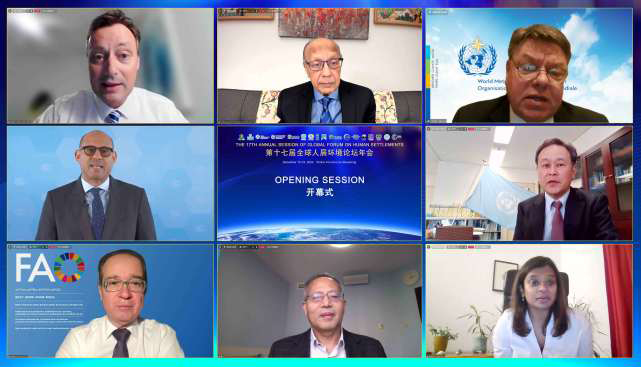
The distinguished speakers at the opening session
The forum was addressed by honorable guests such as Ambassador Anwarul K. Chowdhury, Chairman of Global Forum on Human Settlements, Former UN Under-Secretary-General and High Representative, Mr. Simon Stiell, Executive Secretary, The United Nations Framework Convention on Climate Change, Prof. Petteri Taalas, Secretary General of World Meteorological Organization, Prof. Zhang Yuqing, former Deputy Director General of the National Energy Administration of China, Prof. Zhou Xiaoxin, Academician of Chinese Academy of Sciences and Honorary President of China Electric Power Research Institute, Prof. Jan Gehl, renowned urban planning master, founder and senior advisor of Gehl Architects. The two-day forum has reached over 100,000 professional audiences through live streaming and remote participation.
Major partners showed continuous engagement with this year’s forum. 24 leading organizations joined GFHS 2022 as co-organizers and collaborators, including 10 major UN agencies, such as World Meteorological Organization, United Nations Conference on Trade and Development, Food and Agriculture Organization of the United Nations, United Nations Economic and Social Commission in Asia and the Pacific (UN ESCAP), United Nations Economic Commission for Africa (UNECA), United Nations Development Programme, United Nations Office for Disaster Risk Reduction, United Nations Industrial Development Organization, and United Nations Centre for Regional Development. Other main partners and contributing organizations include the African Development Bank, World Economic Forum, Stockholm Environment Institute (SEI), International Union for Conservation of Nature, World Wildlife Fund (WWF), The Nature Conservancy, and C40.
More than 80 outstanding individuals contributed to the forum, including heads of international organizations such as the United Nations, senior government officials, mayors of leading cities, renowned experts and scholars, and well-known business leaders. The two-day forum was covered by a number of mainstream media outlets around the world. Participants representing more than 50 countries on all continents conducted in-depth discussions on 10 key issues, put forward scientific solutions and policy recommendations, reached a consensus on a set of outcomes and recommended a batch of outstanding sustainable development practices and innovations. The forum has made positive contribution to the implementation of the SDGs and the Paris Agreement.
Ambassador Anwarul K. Chowdhury, Chairman of Global Forum on Human Settlements, Former UN Under-Secretary-General and High Representative reflected the global reality in his opening remarks that “today, over one billion people live in overcrowded settlements with inadequate housing. In the last two decades, cities and urban communities have become the dominant driving force for human development. Sustainable development hinges on fate of world’s cities. The international community is valuing the growing importance of cities and local governments.” He also indicated that local democracy coupled with good governance at the local levels is a key factor for the brighter future of all cities. When States treat local authorities as partners and allow urban residents a voice in the way their streets, stores and workplaces are managed, cities are usually more efficient and livable. Such cities in turn enhance democracy nationally and make local and national economies stronger.
Mr. Simon Stiell, Executive Secretary of UNFCCC started by recognizing GFHS’ important role in providing an essential platform for high-level discussions on building sustainable cities and human settlements, adding that the forum has set a remarkable track record of service and education, and UN Climate Change remains so supportive of its work. He highlighted that “80% of the National Adaptation Plans identify urban areas and settlements as priorities. COP27 delivered a package of decisions that will benefit the most vulnerable - with cities and towns playing a crucial role in shaping their implementation. We need to be mindful of the complex transformation that is needed when it comes to rural-urban coexistence, particularly in how we take a more holistic approach towards human wellbeing and conservation of natural ecosystems. As we enter the new phase of implementation of the climate change agenda, we need to ensure that the solutions we consider are reflective of the complexities and demands of addressing different aspects of human settlements.”
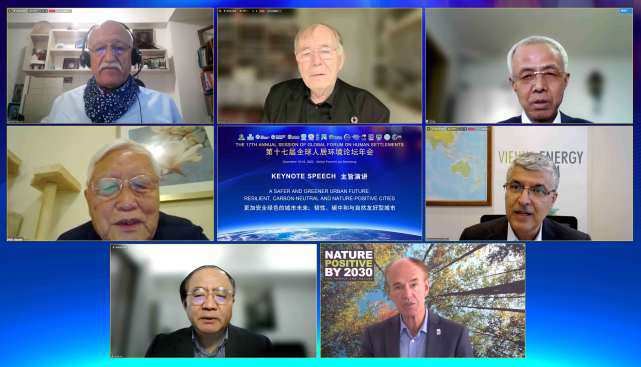
The distinguished keynote speakers
Prof. Petteri Taalas, Secretary General of World Meteorological Organization stressed the importance and urgency to provide early warnings for all, and shared the corresponding action plan which focuses on disaster risk knowledge, preparedness and response capabilities, detection, observations, monitoring, analysis and forecasting of hazards, and warning dissemination and communication. Prof Taalas also shared that ambitious partnership is needed for reliable climate prediction. Current global climate models struggle to represent precipitation and related extreme events, with serious implications for the physical evidence base to support climate actions. A leap to kilometer-scale models could overcome this shortcoming but requires collaboration on an unprecedented scale.
Renowned architect and urban planning master Prof. Jan Gehl stressed that “walking and public life are important aspects of well-functioning human settlements. Walkability is good for climate; the doctors recommend it strongly and foremost meeting fellow citizens in public spaces is important for social life -and it is much loved by people. Looking after people is the simplest and cheapest you can do in city planning, it creates better cities for all, and it is for cities in all parts of the world.”
Academician Zhou Xiaoxin shared that the operation performance of a new power system in the future has to meet the following five requirements, namely flexibility, resilience, stability, reliability and economy. Besides, the concept and basic framework of Integrated Energy Production Unit (IEPU) are put forward. The simulation example analysis shows that IEPU has strong positive and negative two-way flexible adjustment ability, and its duration is basically unlimited. It can realize the large-scale spatial and temporal migration of energy, and improve the resilience of the system under extreme weather conditions.
Dr. Liu Ke, academician of the Australian National Academy of Engineering advocated to replace coal & oil-based economy with green methanol-based economy for carbon neutrality. Its key strategies include: making green methanol from green power and coal, storing, transporting and using wind energy and solar energy in the form of green methanol, and charging green methanol with existing liquid infrastructure.
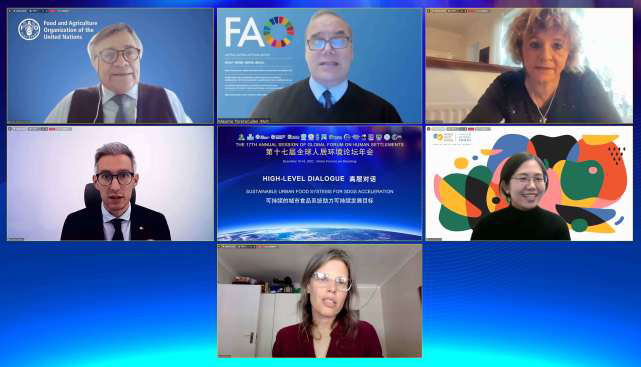
The Panelists at the High-Level Dialogue
GFHS Secretary General Mr. Lu Haifeng pointed out in his closing remarks that “we need to promote decarbonization and decoupling more effectively: decoupling equals decarbonization, and the latter promotes the former. Cities should be both consumers and producers of energy and resources. They should change the linear resource flow into a circular one. Specifically, they should follow the principle of "conservation first, systematic implementation of policies, synergy and efficiency enhancement", and concentrate on the six priorities that this Annual Session has focused on: sustainable urban planning, sustainable waste management, efficient and stable transition to renewable energy, green, low-carbon and smart buildings and communities, people-oriented public space and resilient infrastructure, and sustainable urban food system. By doing so, we can better achieve the goal of resilient, carbon neutral and nature-positive city, and more effectively coordinate to deal with climate crisis, energy crisis, economic crisis, food crisis and the biodiversity crisis for a safer and greener urban future.”
Other important speakers at GFHS 2022 include Kazushige Endo, Director, United Nations Centre for Regional Development, Dr. Awni Behnam, Fmr. United Nations Assistant Secretary General and Hon. President of International Ocean Institute, Marco Lambertini, Director General, WWF International, Tareq Emtairah, Director, Department of Energy, United Nations Industrial Development Organization, Máximo Torero, Chief Economist, FAO, Dr. Stefanos Fotiou, Director, Office of Sustainable Development Goals, FAO, Loretta Hieber Girardet, Chief of Risk Knowledge, Monitoring and Capacity Development, United Nations Office for Disaster Risk Reduction, Datuk Seri Mahadi Che Ngah, Mayor of Kuala Lumpur, Malaysia, Serge Salat, President, Urban Morphology and Complex Systems Institute, Paris, France, Leading Expert of International Green Model City Standards 3.0, Dr. Fedra Vanhuyse, Head of Division, Societies, Climate and Policy Support, Stockholm Environment Institute, Dr. Heinz Schandl, Senior Science Leader, CSIRO Environment, Canberra, Australia, among many others.
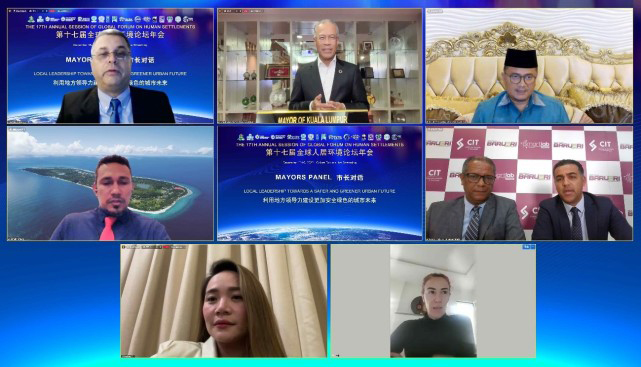
The Mayors Panel
2022 is both a year of hope to end COVID-19 pandemic and a critical year of implementing the 2030 Agenda for Sustainable Development and the climate commitments globally. On an urban planet, cities are always the main battleground to achieve carbon neutrality and guarantee a sustainable and better future. GFHS 2022 therefore called for an urgent collective action to ensure energy security, accelerate the clean energy transition and achieve carbon neutrality at the city level. Cities must make climate change adaptation and overall resilience building a major policy and smart investment to comprehensively improve systemic disaster prevention and mitigation capabilities, thereby building safe and future-proof cities and communities. It is essential to integrate nature into cities, live in harmony with nature, and improve the designing, building, financing and governance of nature-positive cities. The forum also reinforced the call that cities need to accelerate all-round green transformation and innovation, cope with multiple crises and challenges in an efficient and just way, and make dramatic breakthroughs so as to enhance urban resilience, inclusiveness, sustainability and productiveness, thus achieving the end goal of leaving no one behind and no life behind.
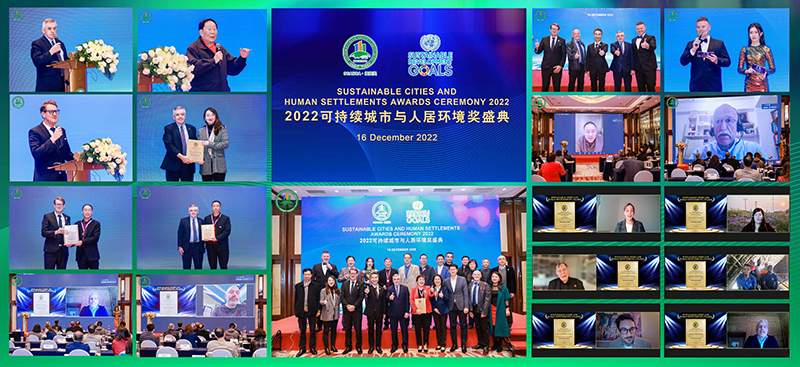
Awarders and Awardees at the Sustainable Cities And Human Settlements Awards Ceremony 2022
On December 16, the two-day forum was grandly concluded with the hybrid Sustainable Cities and Human Settlements Awards Ceremony 2022 (SCAHSA 2022) which recognized outstanding practices and innovations in promoting sustainable cities and human settlements, and recommended innovative concept, green technology and success experience. The awards commit to promote forces for change towards sustainable development on a wider scale.
This year, a total of 22 well-known organizations and individuals from all over the world were honored with the award, including City of San Jose, United States, the well-known global capital of innovation and "Heart of Silicon Valley"; Swiss National Park, one of the earliest national parks in Europe; Professor Jan Gehl, renowned urban planning master; The Meadoway, an excellent ecological restoration project in Toronto, Canada; Chumbe Island Coral Park, Tanzania; Sara Cultural Center in Sweden, one of the tallest carbon-negative wooden buildings; Forest City in Malaysia; Onshore Wave Energy Convertor Technology, Israel; ECOLOO Sustainable Toilet; Parkroyal Collection Marina Bay, Singapore; The Global New Generation of Waste Lithium Battery Safe and Precise Separation Solution; Central Mansion by Shanghai Mingjie Real Estate Development, China, and others. (The complete list of awardees can be accessed here: http://www.gfhsforum.org/award).
(By the Department of Public Information, GFHS)
